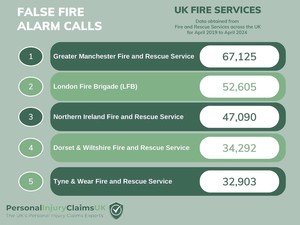

|
Brian Sims
Editor |
| Home> | Fire | >Alarms and Detection | >UK Fire and Rescue Services attend 700,000-plus false fire alarms post-2019 |
| Home> | Fire | >Fire and Rescue | >UK Fire and Rescue Services attend 700,000-plus false fire alarms post-2019 |
UK Fire and Rescue Services attend 700,000-plus false fire alarms post-2019
04 November 2024
A NEW investigation has revealed that Fire and Rescue Services across the UK have been called out to upwards of 700,000 false alarms in the past five years. Obtained by Personal Injury Claims UK under Freedom of Information requests, the statistics suggest that Fire and Rescue Services have responded to no fewer than 747,902 false fire alarms since April 2019.

The data also shows that the number of annual visits conducted by Fire and Rescue Services has been between 130,000 and 180,000 over the same five-year period.
From 2019 to 2020, Fire and Rescue Services attended 136,514 false fire alarms, which was the lowest number of attendances over the past five years. 12 months later, this number increased to 150,913, despite a year of restrictions and lockdowns during the height of the COVID-19 pandemic.
As the COVID restrictions were lifted, the number of false fire alarm call-outs slightly decreased to 146,010 in 2022-2023. Across the past year, Fire and Rescue Services have experienced a huge rise in false alarm calls, with the total standing at 173,946 in 2023-2024.
Common causes
Some common causes of false fire alarms include faulty (or otherwise poorly designed) equipment, poorly trained end users, a lack of systems maintenance, fumes from cooking or food that has burned, steam emanating from showers, dust realised by building or repair work and aerosols being used near sensors.
Often categorised into three types, false fire alarms are where the Fire and Rescue Service attends a location believing there to be a fire incident but, on arrival, no such incident exists (or has existed).
The three types of false fire alarm categories are:
*a fault in (or the accidental use of) apparatus whereby a fire alarm or firefighting equipment operates in error (including due to accidental initiation by individuals)
*good intent: a call is made in good faith in the belief that the Fire and Rescue Service will attend a fire
*malicious: a false alarm is activated with the intention of making sure the Fire and Rescue Service attends a non-existent incident
Most false alarm calls
Personal Injury Claims UK has also obtained figures on which Fire and Rescue Services have reported the most false fire alarm calls over the past five years. Greater Manchester Fire and Rescue Service took the top spot over the London Fire Brigade after having attended 67,125 false alarms since 2019.
The growing number of call-outs is costly for every Fire and Rescue Service, with false alarms impacting them in a number of ways.
CheckFire supplies fire extinguishers across the country, as well as offering knowledge and insight for vital fire safety and protection. A statement on its website reads: “The potential outcomes of false fire alarms range from the inconvenient to the life-threatening. We all know the parable of ‘The Boy Who Cried Wolf’. If a false fire alarm is regularly sounding, people may become unconcerned and refuse to heed the threat posed to their safety. This could cause them not to evacuate a building that’s on fire and put them in grave danger when a real alarm sounds.”
The statement continues: “False fire alarms also cause unnecessary disruption to Fire and Rescue Services and businesses and can impact effectiveness and efficiency, diverting vital Emergency Services away from real emergencies.”
Costly and disruptive
Across the country, false fire alarms continue to be the largest proportion of incidents attended at 38%. They prove to be costly and disruptive, amounting to around £1 billion per annum for the UK. That’s according to a study conducted by BRE Global.
If the trend continues, false alarms could pose an ongoing risk to individuals’ safety and negatively impact the efficiency of the Emergency Services.
*Read the Personal Injury Claims UK research document in full at https://www.personalinjuryclaimsuk.org.uk/personal-injury-compensation/our-research-into-false-call-outs-to-the-fire-service/
**Infographics Copyright: www.PersonalInjuryClaimsUK.org.uk
- Lynne Owens reappointed as director general at National Crime Agency
- Fire Service offers training to spot vulnerable people
- Designed by the Industry
- SIA prosecutes brothers
- Safety, Health and Wellbeing Live regional shows launched by What Else Events
- The Future of Facial Recognition Technology in Combating Bias
- CIS Security’s managing director Neill Catton appointed chair of City Security Council
- Met's new head of Counter Terrorism
- Network Rail fined circa £700,000 for Health and Safety failings at Kent substation
- ExcelRedstone to deploy Maxxess eFusion integration at City of London development












